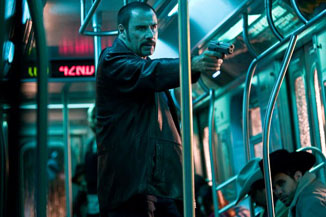Movie Review: The Taking of Pelham 1 2 3
By Matthew Huntley
June 22, 2009
The Taking of Pelham 1 2 3 couldn't be a more appropriate title for this overproduced action thriller. Indeed it suggests the movie will ride along a one-way track and progress more or less by the numbers. The reason it probably feels so average is because it's a remake and the plot has been done several times over: maniacal villain holds innocent people hostage. The catch, I suppose, is that it takes place on a New York City subway station, but even that aspect doesn't make it particularly interesting. We still get the standard hostage negotiating, the standard bonding between good guy and bad guy and the standard climactic chase scene.
Standard. That word keeps coming to mind when I think back on this movie. It's not like there's anything offensively bad about it. After all, it has two of Hollywood's biggest stars and a decent amount of action and emotion. The problem is none of these elements go beyond the usual limits. What happens in the movie is more or less what we expect, and so all we can do is watch the movie go through the motions the same way the hero expects to go through his routine day, which, for him, turns out to be anything but.
The hero I speak of is Walter Garber, played by the always sympathetic Denzel Washington. Garber considers himself a mere civil service employee trying to make ends meet and send his kids to college. Surprisingly, the screenplay provides Garber an extra dimension by making him less than squeaky clean. The same cannot be said of the villain, an ex-con named Ryder (John Travolta), who, along with three other brutes, all with devilish-looking facial hair, hijacks the NYC subway train called Pelham 1 2 3 and holds the passengers hostage until the mayor (James Gandolfini) agrees to pay him a $10 million ransom.
Garber happens to be the attendant on call when Ryder makes his demands. Their conversations turn into a quid pro quo of sorts, as Ryder senses Garber's possible guilt in a business bribe and demands he exchange the information. Ryder may be a lunatic with few moral values, but he does have some good points to make, although his pontificating over the problems with society grows tiresome. No matter how much he b*tches, we never really care about his struggles. He's such an obvious bad guy (sinister goatee, short haircut, tattoo on his neck), the movie throws away any chance to develop him beyond crazy and violent. In the end, he's sort of a dull villain. Plus, we've seen Travolta play this over-the-top role before in Broken Arrow and Face/Off. As good as he and Washington may be, they're are not exactly stretching their acting abilities here, and it's not exactly inspired casting.
I mentioned the movie is overproduced, and that's more evident when you compare it to the original Pelham 1 2 3 from 1974, which was also based on the novel by John Godey and starred Walter Matthau and Robert Shaw. Granted, the new version has come out over 30 years later, but it shows how much Hollywood filmmaking has changed, and not necessarily for the better. The original was directed by Joseph Sargent and was greatly understated, relying on the strength of its story and characters. It wasn't nearly as loud, lurid or shiny as the remake, but it engaged us a lot more with its subtlety and restraint. It also contains one of the greatest endings of all time, one that was succinct and to the point, yet completely satisfying. It told us everything we needed to know in one lone shot.
The new version, directed by Tony Scott, caters more to audiences with attention deficit disorder. The camera does not sit still (one particular shot of the mayor may actually induce motion sickness) and there's never a quiet moment on the soundtrack. It's all professionally and competently done, but the techniques are overkill and feel like attempts to mask the conventional plot. The whole production reminded me of an episode of CSI (it doesn't matter which one), with its flashy, overblown colors, shaky motion and "whoosh" sound effects on a lot of the cuts. These stylistic choices have become so overused their effect is now limited.
When it comes to remakes, I usually ask myself which version does a better job of telling the same story. That answer is almost always the original (after all, if the original was no good in the first place, why would anyone want to remake it?). Unfortunately for Pelham 1 2 3, this is also the case. It speeds along but offers little in the way of surprises or different directions for the genre. The original gave it a lot to live up to, but even if this version wasn't a remake, I would still feel like I'd seen it before, just on a different mode of transportation. With any genre picture, it's important to imagine, or in this case, re-imagine, conventional material in a fresh or interesting way. Scott merely goes down a familiar track. It's been done before and will no doubt be done again.




